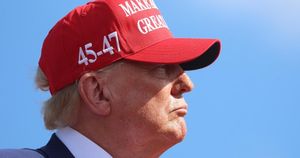Argentina is on high alert as international tensions rise over the management of fugitive rioters from Brazil, with authorities recently targeting 61 individuals linked to significant political unrest. These tensions have their roots deeply embedded in the upheaval caused by supporters of former Brazilian President Jair Bolsonaro, who stormed government buildings on January 8, 2023, one week after Luiz
Ignácio Lula da Silva assumed the presidency.
The storming was chaotic, reminiscent of the U.S. Capitol riot on January 6, 2021, where thousands breached barriers, demanding military intervention to undo the election results. Now, Brazilian judicial authorities have taken decisive action, issuing extradition requests for individuals who managed to escape justice by fleeing to Argentina. This situation has revealed crackling legal and political ramifications for both countries involved.
Joining the chorus of demands, Federal Judge Daniel Rafecas has ordered the arrest of 61 Brazilians currently residing illegally in Argentina, many of whom had already been convicted of serious charges, including insurrection and vandalism. Among the fugitives, only two have been apprehended so far — Joelton Gusmão de Oliveira and Rodrigo de Freitas Moro Ramalho — both of whom face lengthy prison sentences back home.
According to judicial sources, these individuals were detained during routine checks at migration offices, as they sought to renew their temporary residency status. Arresting suspects just as they are attempting to regularize their immigration status emphasizes the intensity of Argentina's cooperation with Brazil, aiming to uphold the law, albeit amid heated debates about political asylum for those involved.
Reports suggest Brazilian officials estimate there are between 50 to 100 individuals who fled to Argentina, trying to evade lengthy prison sentences for their roles in the riots — some anticipating potential refuge under the leadership of President Javier Milei, who has shown camaraderie with Bolsonaro's political rhetoric. The political undertones complicate the extradition process, as many escapees had explicitly stated their fears of receiving fair trials back home.
During the assault on Brazilian institutions, Brazilian authorities swiftly acted, arresting around 3,000 people, with approximately half still awaiting trial or serving their sentances. Brazil has implemented harsh punishments, dubbing acts against the state under the auspices of the 2022 legal statute aimed at protecting democracy. Most sentences handed down have hovered around 16 years, and these are non-appealable under the Supreme Court’s jurisdiction.
More indirect pressurizing seems to stem from the Brazilian authorities’ contention with Argentina’s current political leadership. A key question lies at the heart of negotiations: How willing is President Milei to assist Brazilian authorities? Both Milei and Brazilian Justice Minister Alexandre de Moraes appear to maintain friendly rapport, which could facilitate easier dealings. Still, Milei’s administration must navigate domestic sentiments around extradition and political asylum — two concepts often clashing when incidents of such political unrest arise.
The question remains, what will happen to the myriad of cases still pending against these Brazilian fugitives? There is increasing speculation about the motivations behind arrests, with strong currents of political bias alleged, especially among defense attorneys and family members of the detainees. "It’s absurd, it’s a smokescreen...this is all going to bury Alexandre de Moraes's coming actions," claimed one activist believed to be associated with one of the arrested individuals.
Despite the outcry surrounding possible politically motivated arrests, concerns have also been raised about due process and the rights of the accused. A judicial source reiterated, the requests for political asylum invoked do not automatically shield them from arrest or extradition, especially when they already carry final judgments.
This legal nuance complicates matters for those who believe they deserve more humane treatment upon their return to Brazil. With many cases reflecting how national sovereignty intersects with the need for international cooperation, Argentina's legal framework will continue to play out amid growing suspicions and public protests, both for and against the extraditions.
With both countries moving forward, it’s obvious they are both being shaped and reshaped by the precedents set during these political upheavals. Navigational parallels can be drawn from Brazil’s approach to democracy and Argentina’s newfound judicial sturdiness, especially facing its citizens caught up within this political bubble. The environment is highly volatile; the coming weeks will reveal just how Argentina and Brazil handle political rivalry, civic safety, and extradition laws intertwined with political identities.



